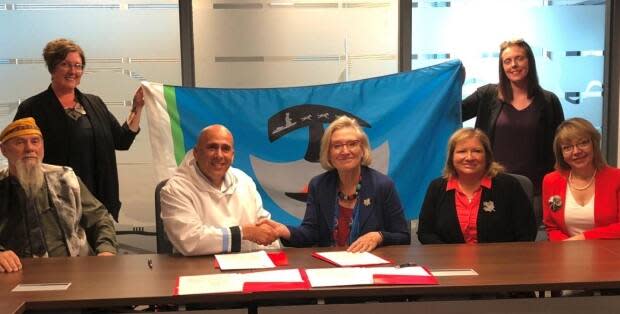Nunatsiavut, Innu Nation reject land claim by NunatuKavut community council


The executive council of the Nunatsiavut government has rejected the NunatuKavut community council's claim to land in Labrador.
In a media release Thursday, the Nunatsiavut government said following a "research and consultation process," it had concluded that while NunatuKavut may have some Indigenous members, it has no viable land claim.
"Our consultations and the history of our people make our position clear. We do not recognize the NCC proposed land claim, " said Nunatsiavut's executive council president, Johannes Lampe. "We have been hearing from our beneficiaries that they want Nunatsiavut to speak to this issue for a while, and we took our time to take an informed position."
In a statement, the NCC rejected the opinion of the Nunatsiavut government, arguing that it "blatantly undermines" the self-determination of NunatuKavut Inuit.
"The Nunatsiavut government does not have the authority to accept or reject our land claim. The opinion expressed in their media release is hurtful and harmful," the NCC said.
The statements are the latest development in a long-simmering dispute between the NCC, the Nunatsiavut government and the Innu Nation.
The NCC represents Inuit and people of Inuit ancestry in central and southern Labrador, the Nunatsiavut government represents Inuit communities in northern Labrador and the Innu Nation represents the Innu of Labrador, primarily in Sheshatshiu and Natuashish.
In September 2019, the NCC signed a memorandum of understanding with the federal government, laying the foundation for future negotiations regarding land and other resources.
The Innu Nation asked the court to quash the MOU, arguing that former Crown-Indigenous Relations Minister Carolyn Bennett did not properly consult the Innu on the agreement. In 2020, the Nunatsiavut government joined the Innu Nation's court challenge as an intervenor.
Both the Innu Nation and the Nunatsiavut government have argued that NCC members are not Indigenous under Section 35 of the Constitution Act.
The Innu Nation on Thursday released a statement in agreement with the statement from the Nunatsiavut government.
"Just because you have some members that have some Indigenous identity doesn't make you a nation. You can't just make this stuff up," said Grand Chief Rich.
A question of self-determination
In an interview with Labrador Morning's Janice Goudie, Lampe said the Nunatsiavut government decided to release the statement in response to concerns from its beneficiaries.
"NCC is not a collective. There are, you know, some people who have Inuit ancestry or background themselves, but it is not a collective," he said.
Lampe said the NCC's land claim infringes on the existing land claim by the Inuit of Nunatsiavut.
"We will do whatever we have to do to protect our land claim," he said.
He acknowledged that there are people with Inuit ancestry throughout Labrador, but he took issue with the Métis history of the NCC. When asked if members of the NCC should apply for membership under Nunatsiavut, he said he wasn't willing to "go there" at this time.
The NCC was formerly known as Labrador's Métis Nation, but in 2010 changed its name to reflect its membership's Inuit heritage.

NCC president Todd Russell said the Inuit identity of its membership has never been in question, and he noted that the federal government has already officially recognized the NCC as an Indigenous collective capable of holding rights under Section 35.
"We have rights here. This is our home. And we will continue to do the very, very good work that we have been doing and we'll continue to do."
Russell said Lampe's statements are "a contradiction."
"At the end of the day, all we've ever done in our organization is build our people up to strengthen our people, our young people, particularly in their sense of identity, in their sense of place, in their sense of rights," he said.
Russell called the research process undertaken by the Nunatsiavut government "unethical" because the NCC was not consulted. He said the NCC has repeatedly asked the Nunatsiavut government to meet about the issue it's raised.
Russell said the NCC has been conducting its own "exhaustive" research since 1991, and is the only authority on NunatuKavut Inuit rights.
"There seems to be a sense, within at least some people's minds, that somehow we are a threat to Nunatsiavut rights, to Nunatsiavut land claims. Nothing could be further from the truth," he said.
Russell said he hopes the three groups can begin to work together.
"Working together is where we're going to accomplish the most for all of our peoples, whether they be Nunatsiavut Inuit, NunatuKavut Inuit, whether they're Innu Nation."

